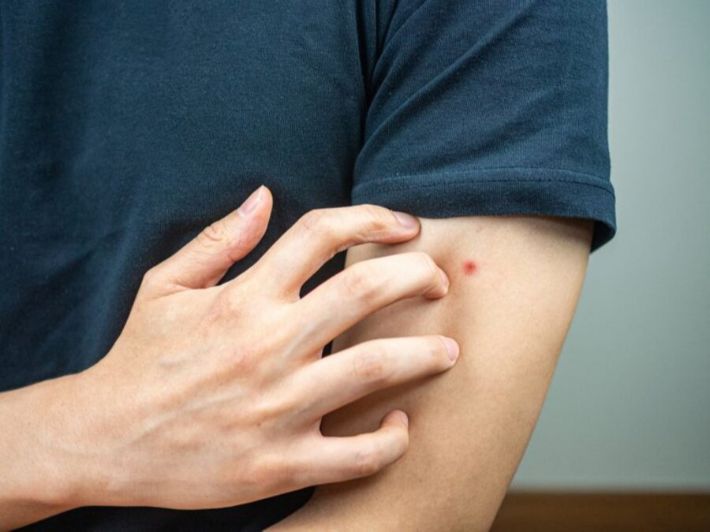ما هي المواصفات التي يشتهيها البعوض؟

ما هي المواصفات التي يشتهيها البعوض؟
ما هي المواصفات التي يشتهيها البعوض؟
على عكس ما قد يعتقده البعض، فإن البعوض لا يلدغ الإنسان من أجل الحصول على الطعام، حيث إنه يتغذى على رحيق النبات، إنما تلدغ إناث البعوض فقط بغرض تلقي بروتينات من دم الإنسان تكون لازمة لتطوير بيضها، بحسب ما نشر موقع CNET.
عوامل الجذب
وإن هناك العديد من العوامل التي تؤثر على سبب تعرض بعض الأشخاص للدغات البعوض أكثر من غيرهم من بينها:
1- لون الملابس
يعتبر البعوض صيادا بصريا للغاية، مما يعني أن ألوان الملابس يمكن أن تساعد في تسهيل اصطياد البعوض للفريسة البشرية، حيث أظهرت بعض الأبحاث أن البعوض ينجذب أكثر إلى اللونين الأسود والأحمر.
2- ثاني أكسيد الكربون
وكما يستخدم البعوض البصر فإن شم الرائحة وسيلة أخرى يعتمد عليها للعثور على مضيفات للدغات، ويمكن للبعوض أن يشم رائحة الإنسان من خلال ثاني أكسيد الكربون المنبعث عند التنفس.
ووفق بحث نُشر في دورية Chemical Senses، يستخدم البعوض عضوًا يسمى ملامسة الفك العلوي للكشف عن ثاني أكسيد الكربون، ويمكنه الشعور به من مسافة 164 قدما.
ونظرًا لأن ثاني أكسيد الكربون عامل جذب كبير، فإن الأشخاص الذين ينبعث منهم كميات أكثر، أي الأفراد الأكبر حجما والأشخاص، الذين يتنفسون بكثافة أثناء ممارسة التمرينات الرياضية أو الرقص في أماكن مفتوحة، يكونون أكثر جاذبية للبعوض.
3- رائحة العرق
كما ينجذب البعوض إلى مواد ومركبات أكثر من مجرد ثاني أكسيد الكربون، إذ يمكن أن يهاجم البعوض أشخاصا بعينهم عن طريق شم إفرازات على أجسامهم مثل العرق وحمض اللاكتيك وحمض البوليك والأمونيا.
ولا يزال الباحثون يدرسون سبب كون بعض روائح الجسم أكثر جاذبية للبعوض، لكنهم يعرفون حتى الآن، أن الجينات والبكتيريا الموجودة على الجلد والتمارين الرياضية تلعب جميعها عاملاً.
وتؤثر العوامل الوراثية أيضاً على كمية حمض البوليك المنبعثة من أجسام البعض، بينما تزيد التمارين الرياضية من تراكم حمض اللاكتيك.
4- فصيلة الدم
ويسود أيضا اعتقاد شائع بأن البعوض ينجذب إلى أنواع معينة من الدم، مع الأخذ في الاعتبار أن البعوض يلدغ البشر من أجل دمائهم، ويتم تحديد فصيلة الدم من خلال علم الوراثة، ويتم إنشاء كل فصيلة دم بناءً على مجموعات مختلفة من البروتينات المحددة، تسمى المستضدات، على سطح خلايا الدم الحمراء، وهي أربعة أنواع رئيسية A وB وAB وO.
وعلى الرغم من عدم وجود استنتاجات قاطعة حول نوع فصيلة الدم الأكثر جاذبية للبعوض، فقد أشار العديد من الدراسات إلى أن أصحاب فصيلة الدم O هم الأكثر شهية للبعوض.
ولاحظت دراسة أجريت عام 2019 سلوك تغذية البعوض عند تقديمه مع عينات مختلفة من فصيلة الدم، وتبين أن البعوض يميل إلى فصيلة دم O المُغذية أكثر من أي نوع آخر.
كما توصلت دراسة، أجريت عام 2004، أيضًا إلى أن البعوض يهبط على إفرازات فصيلة الدم O بنسبة تصل إلى 83.3%، وهي أكثر بكثير من إفرازات مجموعة فصيلة الدم A، التي تقدر بحوالي 46.5%.
ولكن يبقى أن نتائج تلك الدراسات ليست نهائية، ولا يزال هناك الكثير من الحديث عن تفضيلات البعوض عندما يتعلق الأمر بفصيلة الدم.
من البقع إلى الكدمات
ويمكن أن تتراوح لدغات البعوض في الحجم من مجرد بقع صغيرة إلى الكدمات الكبيرة، ويرتبط حجم وشدة اللدغة بكيفية استجابة الجهاز المناعي لكل شخص للعاب، الذي تدخله البعوضة عند اللدغة.
فعندما يلدغ البعوض، فإنه يحقن بعض اللعاب عند سحب الدم، ويحتوي هذا اللعاب على بعض مضادات التخثر والبروتينات، مما يحفز جهاز المناعة على الاستجابة لهذه المواد الغريبة.
ويستجيب جسم الإنسان بإفراز الهيستامين، وهي مادة كيميائية تفرزها خلايا الدم البيضاء عندما يقاوم جهاز المناعة مسببات الحساسية، مما يسبب الحكة والتهاب اللدغة.
الوقاية والعلاج من لدغات البعوض
وتتضمن بعض الطرق الشائعة للوقاية من لدغات البعوض ما يلي:
• استخدم طارد وبخاخات مضادة للحشرات
• استخدام مبيدات الحشرات الطبيعية، مثل زيت النيم وزيت الزعتر
• تجنب الخروج عند الفجر أو الغسق
• تجنب الملابس ذات الألوان الداكنة وخاصة السوداء
• التخلص من المياه الراكدة بالقرب من المنازل
• استخدام شبابيك أو أبواب من السلك الخفيف أو ستائر تسمى “الناموسية”
وعلى الرغم من أن لدغات البعوض مزعجة، إلا أنها غالبا ما تكون غير شديدة وستزول في غضون أيام قليلة، وفي هذه الأثناء فإن هناك عدة علاجات للتخفيف من الحكة والالتهاب:
• التنظيف باستخدام الكحول الطبي إذا كانت اللدغة حديثة
• استخدام مضادات الهيستامين التي لا تستلزم وصفة طبية
• وضع كريمات الكورتيكوستيرويد الخفيفة
• استخدام الصبار لتقليل الالتهاب
• استخدام الكمادات الباردة
وعلى الرغم من صعوبة القيام بتلك النصيحة إلا أنه يمكن المحاولة قدر المستطاع عدم حك موضع اللدغة بشدة لمنع أي نوع من رد فعل الجلد أو العدوى.






